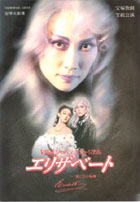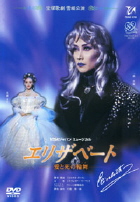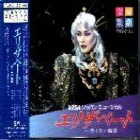Elisabeth
Picture Credit: V
English Title: Elisabeth
Japanese Title: 『エリザベート』
Romanized Title: Erizabeeto
Troupe: Snow
Year: 1996
Performances: Grand Theater, 2/16 - 3/25; Tokyo Theater 6/3 - 6/30
Based On: Austrian musical Elisabeth; book/lyrics by Michael Kunze and music by Sylvester Levay
Translator: Kurosaki Isamu
Director: Koike Shuuichirou
Music Director: Yoshida Yuuko
Choreographer: Hayama Kiyomi, Shou Sumire, Maeda Kiyomi
Available on DVD: Yes (release date 9/21/02)
DVD Scene/Music Cut: No
Other Cast: Chiya Akira, Haruno Wakaba, Iraka Maya, Asakage Rui, Shu Michiru, Morio Kazumi, Suzusato Yuuka, Kouzuki Mari, Kasai Hitomi, Kishiro Miki, Aki Mizuho, Hibiki Maria, Asada Kou, Hanabuki Mai, Hitomi Rika, Yuuki Mao, Mizutani Shino, Michi Kiyora, Saezuki Akira, Haru Ayuka, Mariho Erina, Tamaki Kaho, Minaho Karin, Namiki Akira, Yumena Saya, Mitsumi Akiho, Matsuyuki Kanako, Kazami Yoshiki, Ere Marina, Yurika Shiho, Marina Miho
Other Cast (Grand Theater only): Marika Nami, Kojou Ran, and Komari Nana.
82nd Class (Tokyo only): Tachibana Riya, Misumi Kanon, Maisaka Yukiko, Saeki Seiya, Asaka Serena, Ayuna Sae
† Hanamiya Airi was absent for the entire run due to illness.
WARNING!! MAY CONTAIN SPOILERS!!
In the realm of the dead, Luigi Lucheni is on trial for the assassination of Empress Elisabeth. The disembodied voice of the judge rings out, demanding to know why Lucheni killed her. Lucheni responds, in his own defense, that he was doing her a favor as Elisabeth and Death were lovers. He calls upon the ghosts of Elisabeth's family and friends to corroborate this statement. Death appears in their midst, a pale, androgynous, eternally youthful man who admits that he was in love with Elisabeth.
Elisabeth was the third child of Max, Duke of Bavaria, and Ludovika, daughter of the Bavarian king. Ludovika had three sisters, all of whom had married into higher positions than she had. One of these, Elisabeth's aunt Sophie, was married to the Austrian Archduke Franz Carl. The Archduke was in line for the Austrian throne, but chose to abdicate in favor of their son, Franz Joseph. Sophie was in a position of great power, with her husband's mental health declining and her eighteen year old son, an emperor, hanging on her every word. Sophie was the real ruler of Austria, and everyone knew it.
Sophie and Ludovika arranged for Franz Joseph to marry Elisabeth's older sister Helene, so Helene was groomed for this purpose for years. Elisabeth, on the other hand, was a precocious and energetic girl who liked playing with her brothers and idolized her father. As it was her sister that everyone was focusing their attentions on, she enjoyed more freedom than she might otherwise have had.
Elisabeth's first encounter with Death comes when she is about fifteen; she attempts a tightrope walking stunt at a family event and suffers a bad fall. She meets Death, who falls desperately in love with her independent, fiery spirit. He releases her back to the world, but promises to follow her throughout the rest of her life.
When the time comes for Franz Joseph to meet his future bride, the unthinkable happens; he falls in love instead with the irrepressible and beautiful Elisabeth, and chooses to marry her instead of her sister Helene. Elisabeth, too, is charmed by the young Emperor and for a brief time the two young lovers are very happy together, in spite of their family's misgivings. Death is never far from Elisabeth's side, however, and he seems jealous of their love. At the wedding, Death himself officiates and rings the bells. He appears to Elisabeth and tells her that he loves her, but she has chosen someone else; however, he will still win because in the end it will be he who gets the last dance with her. Elisabeth is terribly frightened and runs to Franz Joseph for comfort.
The newlyweds' happiness is short-lived, as Elisabeth soon finds her new mother-in-law to be unbearably critical, strict, and at times even cruel. Sophie spares no time in beginning a strict regimen of training and chastization in the attempt to break Elisabeth's spirit and mold her into the perfect puppet-like daughter-in-law that she's always wanted. But Elisabeth will not be broken. She turns to her husband for help, but Sophie has so much influence over the young Emperor that he is unable to stand up to her. Elisabeth feels abandoned, and Death appeals to her to come to him. But Elisabeth is extremely stubborn. No one, she declares, not her husband or her mother-in-law or even Death himself can tell her what to do. She belongs only to herself.
Elisabeth gives birth to two daughters before finally producing the much-desired son and heir to the throne. Death takes one of her daughters, and Sophie takes the other two children away. This is the blow that Elisabeth cannot recover from; she is not allowed any say in the upbringing and education of her own children, as Sophie tends to that personally. Elisabeth's only comfort is in tending to her own physical beauty; she begins to obsessively care for her skin, weight and hair. The people of Austria are shocked and infuriated; they are struggling for food, there is a milk shortage, and Elisabeth literally bathes in milk each day to care for her skin. But even these luxuries cannot make her feel better, and she withdraws from everyone, including her husband.
In Hungary, an independence movement has been gaining strength. But when Elisabeth makes a strong public display of her support of Hungarian rights (by wearing a gown designed after the Hungarian flag), the Hungarians start praising her instead of crying for independence. Death tempts Elemer Batthyany and other Hungarian revolutionists to go to Vienna, where they will gather more revolutionists and secretly work out plans to bring down Austrian rule.
Franz Joseph still loves Elisabeth passionately, and is worried about her increasing coldness towards him. In truth, she loves him too, but knows that his love for her is the only power she has with him. Elisabeth gives Franz Joseph an ultimatum; either he must stand up to his mother and give Elisabeth back her children, or she will no longer allow him in her bedchambers. Again, Death tries to seduce Elisabeth, but she rejects him.
The street is abuzz with the news that thanks in great part to Elisabeth's political commitment to the Hungarians, Franz Joseph and Elisabeth are to be crowned King and Queen of Hungary. The Hungarians, and the rest of the world, adore Elisabeth, while strangely enough her own country hates her.
Rudolph, Elisabeth's son, is growing up without her. He is a sensitive and emotional child who misses his mother. Elisabeth is locked in a power struggle with Sophie over him, and sometimes it seems that she cares more about beating Sophie than about the welfare of her son. Death visits Rudolf, who is crying for his mother, and tells the boy that he is a friend who will always stay near to him.
Franz is indecisive in regards to Elisabeth's ultimatum; even his love for his wife cannot overpower the level of influence his mother has over him. Sophie can see what Elisabeth is trying to do, and maliciously plots to undermine Elisabeth by taking her son to a brothel. Sophie encourages Franz Joseph to enjoy the company of other women if his wife is going to be so obstinate; and Franz, who is lonely, finds it all to easy to succumb to the charms of the women fawning all over him.
Death approaches Elisabeth again, and takes pleasure in informing her of the infidelities of her husband. Brokenhearted, Elisabeth cannot stand the court any longer and begins to travel even more than before, staying away from home as much as possible. Both Franz Joseph and Rudolph miss her terribly, but in her frantic attempts to run from those who would control her, she cannot see how much her loved ones are hurting in her absence. Ten years of endless travel pass by; Franz Joseph ages, Sophie dies, and Rudolph becomes a young man. Rudolph and his father don't seem to get along, and Rudolph feels abandoned. More and more, Rudolph turns to Death as his only comfort and companion.
Elisabeth, travelling like she's being chased, visits an asylum to give gifts and comfort to the patients. She encounters a crazy woman who believes SHE is the Empress Elisabeth. Elisabeth is both touched and horrified, and holds the woman close, finding it hard to imagine why anyone else would want her life.
During one of Elisabeth's brief returns home, Rudolph approaches her. His obsession with his mother has nearly become an Oedipus complex, and he begs her to help him, to stay with him, to talk to Franz Joseph on his behalf. But Elisabeth, too wrapped up in her own pain, brushes him off, saying she's fought her entire life to stay out of anyone else's control and will not ask Franz Joseph for anything. Rudolph, sensitive just like his mother, feels abandoned in much the same way Elisabeth did when Franz Joseph would not help her stand against Sophie. He returns to the arms of Death, and shoots himself in the head.
Rudolph's suicide causes Elisabeth to realize just how her actions have harmed the people she loves; she was not there for her son, left him alone with his demons just as she was alone with hers, and he gave in to Death. She feels like a failure, and begs Death to come to her. But Death wants her love, not her life, and refuses to take her.
Elisabeth continues to travel, and now Franz Joseph occasionally follows her, so lonely for her company that he will join her on some of her travels just to spend a bit of time with her. The two of them talk about their relationship, and Elisabeth insists that they are such different people, with such different destinations in life, that it's like they're two ships bound in opposite directions who occasionally meet on the sea. Franz Joseph is greatly saddened by how far apart they have drifted, and how irreparable their relationship has become. He grows very old, and eventually Death takes him as well.
Lucheni has so far been a passive observer and narrator in this story; he sold trinkets and Elisabeth souvenirs on the streets during the height of her popularity, and carries around a camera documenting her life in photographs. But now the judge wants to know how it came to be that Lucheni assassinated Elisabeth. Lucheni explains that he originally intended to kill the Prince of Orleans, but he was not there, and Elisabeth was. He claims that Death appeared to him and gave him the murder weapon; perhaps Death was tired of waiting for Elisabeth to come to him of her own accord? And so Lucheni approached Elisabeth on the street and stabbed her to death, thereby releasing her into the arms of her lifelong true love.
Death and Elisabeth finally embrace, and he kisses her. Elisabeth asks him to care for her and protect her from now on; after a lifetime of fighting to belong only to herself, Death asserts that she now only belongs to him.
Takarazuka Performance
Number of Performances: 55
Attendance: 146,000 people
Tokyo Performance
Number of Performances: 47
Attendance: 124,000 people
- Ichiro Maki's sayonara performance
- The Grand Theater performance was the final performance for: Yuuna Reo, Marika Nami, Kojou Ran, Amamiya Moe, and Komari Nana.
- Also the final performance for: Kodai Mizuki, Asakage Rui, Shu Michiru, Takakura Kyou, Hibiki Maria, Asada Kou, and Michi Kiyora.
- An "Elisabeth" Fan Site with a great review of the Snow Troupe Cast Recording.
None yet.
Poster | DVD | VHS | CD
| ||

| 
| 
| 
| ||